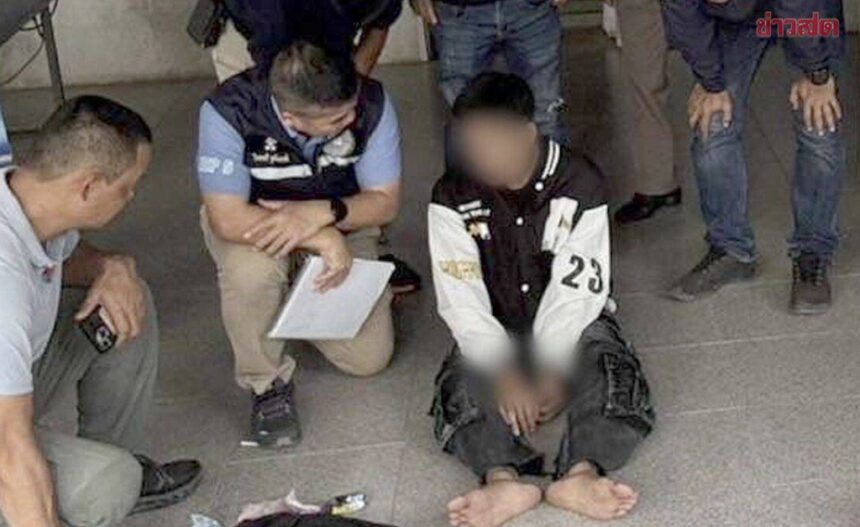LAMPHUN – Police at the Mae Tha checkpoint in Lamphun intercepted and arrested a man known as “Maung,” a foreign national linked to a local youth gang. He was wanted for attacking a 14-year-old girl with a machete, severing her wrist, before fleeing the area.
The attack took place late on September 17 near a convenience store next to a laundromat on the Old San Kamphaeng Road in Chiang Mai. A group of Tai Yai youths reportedly drove through the city, targeting local teens.
In the assault, the 14-year-old girl lost her left wrist, a 17-year-old boy suffered a deep wound to his back, and a 16-year-old girl had her finger severed. Police were ordered to prioritize this case and hunt for those involved.

By September 18, local officers at the Mae Tha drug checkpoint detained “Maung” as he tried to escape by motorbike. Police confirmed that he had a history of similar violence, including an incident in March in the Chang Phueak area.
Authorities previously caught another suspect, “Dao,” while a third suspect, “Top,” is believed to have fled to another province. Police in Region 5 continue working to track down the remaining suspect.
According to the Police, teen gangs are causing growing concern in Chiang Rai and Chiang Mai, putting pressure on both public safety and the local reputation of these northern Thai cities.
Reports have shown a rise in youth crimes, with groups of teenagers involved in assaults, thefts, and violent attacks that affect both residents and visitors. Experts believe this increase stems from poverty, shifting cultural values, and the strong pull of different subcultures from inside and outside Thailand.

In Chiang Mai, police have tracked 17 active youth gangs, including groups like the Dao-Rai and Bang gangs, that operate across four districts. These gangs, usually made up of teens between 14 and 20, take part in everything from street fights to planned robberies.
In response, local authorities have boosted police patrols, set a 10 PM curfew for minors, and teamed up with schools and NGOs to tackle root issues like low family income and poor access to schooling.
Chiang Rai faces similar issues. In September 2025, local police broke up a youth gang linked to public unrest, confiscating guns, explosives, and drugs like methamphetamine. The city’s location close to the Golden Triangle, a well-known centre for drug smuggling, makes things worse.

Some youth gangs use homemade bombs, called “ping pong bombs”, to scare motorbike riders and shop owners. Local people, including business owners such as Kanya, have spoken about how these events hurt Chiang Mai’s image as a safe place for tourists.
Research suggests the reasons behind gang violence go beyond feeling left out. Many teenagers, especially those from poorer or migrant families, use gang membership to feel important, prove themselves, or follow local ideas about toughness.
Police crackdowns do take place, but short jail terms from three to six months rarely stop youths from rejoining gangs once released. Community efforts like the Chiang Mai Youth Club hope to bring a lasting change by getting former gang members involved in sports and leadership activities that offer a different path forward.
Related News:
Police Hunt for Dangerous Youth Gangs in Chiang Mai and Lamphun














